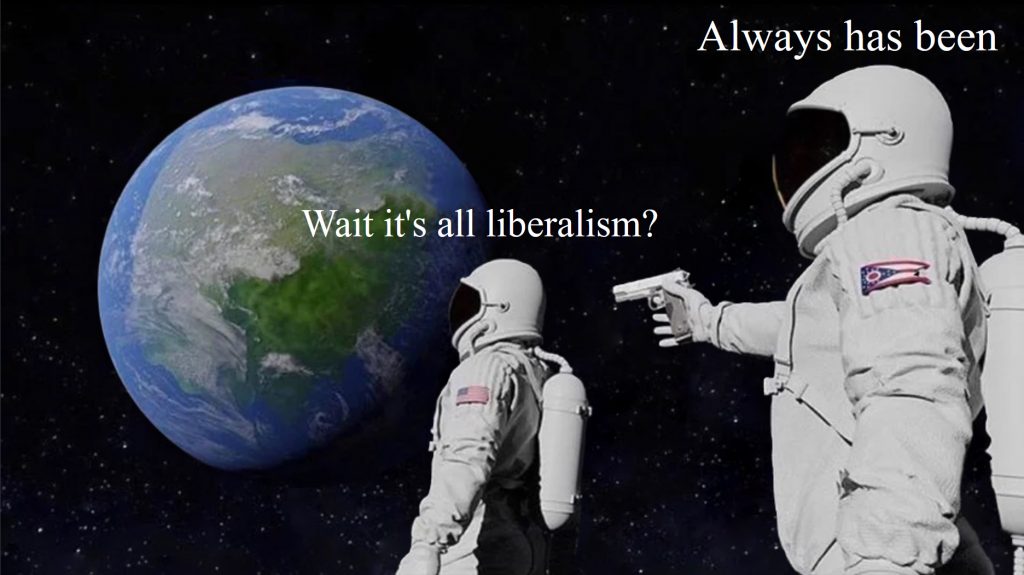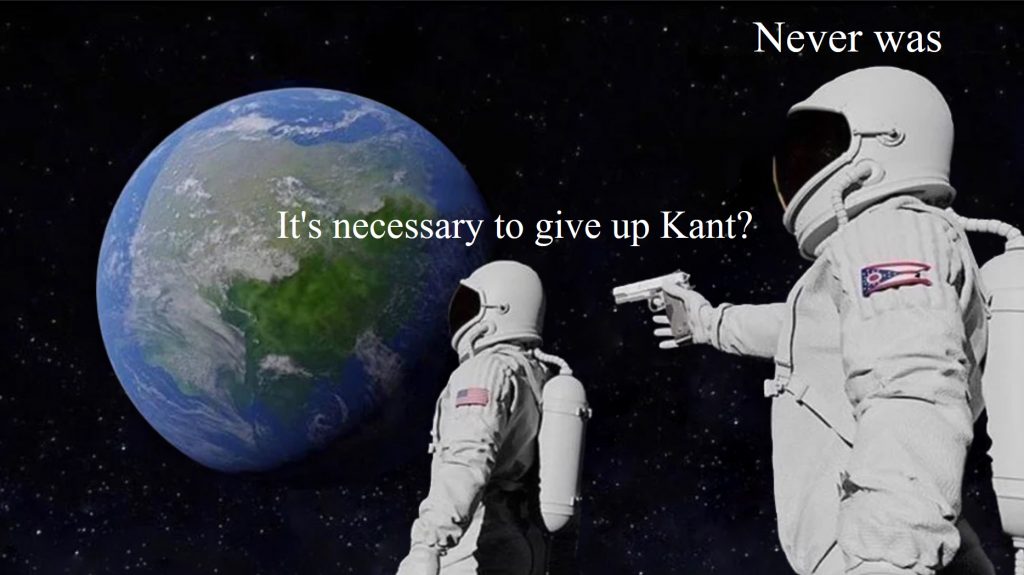
(On Tuesday, September 1, 2020, Lucy Allais of University of California, San Diego and University of Witwatersrand gave a virtual talk, “Racism in the History of Philosophy: Read Kant’s Political Theory” as part of the Unit for Criticism and Interpretive Theory‘s Modern Critical Theory lecture series. The remarks below first appeared in Kritik.)
The recurrent question of Immanuel Kant’s racism, addressed with alacrity by Dr. Lucy Allais, presents a special opportunity to revisit some very important issues relevant to the practice of theory today: the canon of Western philosophy, the status or value of abstraction, and the evaluation of this protean, even amorphous thing called “liberalism.”
Quite correctly, Allais introduces Kant as a modern philosopher with a seemingly difficult, even troubled relationship to race and the realities of colonialism in his time. This difficulty is in no way unique to Kant, however. Numerous commentators (e.g., Susan Buck-Morss, Neil Roberts, Calvin L. Warren, Sylvia Wynter) have observed there is a disparity between the strong emphasis on emancipation and freedom characteristic of the various Enlightenments in Europe and the general lack of attention to historical and material developments (ranging from the Atlantic slave trade to the Haitian Revolution) given by many prominent Enlightenment thinkers. Jean-Jacques Rousseau (one of Kant’s major influences) starts his The Social Contract (1762) by writing, “Man is born free, and everywhere he is in chains.” As Buck-Morss notes, ironically, “No human condition appears more offensive to his heart or to his reason than slavery. And yet even Rousseau, patron saint of the French Revolution, represses from consciousness the millions of really existing, European-owned slaves, as he relentlessly condemns the institution” (32). There are indeed serious questions about the moral or political efficacy and the philosophical validity of the universalism Enlightenment thinkers expound, especially given the context in which their claims about autonomy, equality, rationality, and rights are produced. Prima facie, this concern applies equally to Kant (despite sometimes spirited protestations to the contrary by many devout Kantians in Anglophone philosophy departments).
To unpack the criticism, Allais turns to Charles W. Mills, whose engagements with Kant (and many other moderns to boot) on the topic of race figure quite prominently in recent scholarship. Unlike many critical theorists, Mills refuses to rely on a caricature of Kant. In any case, Mills remains deeply critical. For Mills, Kant’s moral and political universalism contains an intrinsically racial scope of application or implication. For Kant, agency and autonomy are possible only on the basis of a properly circumscribed and practiced rationality. Only rational agents are really agents at all, as opposed to slaves of the body and its compulsions, passions, and senses. On Mills’s account, then, for Kant, there may well be plenty of humans who do not meet the minimum standard of rationality necessary for full moral personhood. (Many commentators, including both Allais and Mills, point out that there are many examples of Kant’s own racist views on display in his writings. That being said, philosophy cannot and must not be reduced to biography or history. As theorists and thinkers, we are, or ought to be, most interested in Kant’s philosophical arguments.) Contra Mills, Allais (2016) argues convincingly that Kant, rather than codifying racism into his moral philosophy, actually expounds deeply inconsistent views about race that shift significantly throughout the course of his intellectual career.
The occasion of discussing Kant’s racism, however, raises a number of additional, even more wide-ranging philosophical and political questions about canonicity, abstraction, and liberalism.
First, Allais’s nuanced engagement with Kant and Mills alike emphasizes the canon wars still being waged in philosophy departments and throughout the critical humanities. On the one hand, critical humanists from numerous disciplines have been emphasizing for decades (to varying success) the ways in which the canon of Western philosophy sometimes carries along, disguises, or transmits illiberal or inegalitarian values. On the other hand, philosophers typically seek to evaluate and revise arguments and concepts as rigorously as possible on their own terms. There are benefits and drawbacks to both approaches, which Allais admirably balances.
On the side of the critical humanities, there is the potential benefit of producing significantly more nuanced readings of philosophical texts, read precisely as texts produced in a time and a place by a person with a body and a history. (And note here the degree to which, regardless of downstream consequences for culture and values, or different methodological framings, canon wars are first and foremost, but not only, disagreements about the interpretation of texts.) However, practiced with inattention, this approach runs the serious risk of downplaying or sidestepping the complexity, detail, and rigor of philosophical texts. As Allais notes, you cannot have a serious understanding of the Enlightenment, or modernity, without reading Kant. Regardless of how we view these things, it behooves us to understand them thoroughly first. Otherwise, we reduce our arguments and inquiries to ideological audits of past values, apparently with the expectation that they will, or should, confirm our own (and squawking in protest when they frequently do not). Perhaps too often, the hermeneutics of suspicion end up producing ill-judged, ineffectual prosecutions of circumstance or personal intention, rather than attending to the arguments themselves, in all their complexity, possibility, and promise.
As for the discipline of philosophy, a downside can be the inflexibility or rigidity with which the received canon is treated and policed. In corroboration, simply review the extent to which Anglophone philosophy departments have largely refused to expand and revise disciplinary boundaries so as to include indisputably major philosophers like Gilles Deleuze and Jacques Derrida. (Of course, there are exceptions – and, to no small extent, the razor cuts both ways, as you will rarely find sustained engagements with figures like W. V. O. Quine, Wilfred Sellars, or David Lewis in the walled gardens of critical theory.) On the upside, to put it bluntly, philosophers take abstraction seriously on its own terms. This is a very good thing, not only because humans are highly abstract and symbolically prone animals, but because it keeps open the door for all the many uses attending abstract things. There is a tendency that philosophers typically refuse, which is the tendency to classify abstractions as airy and arid, as immaterial veils that obscure concrete realities. As we know, however, abstractions (categories and concepts, laws and logics) are inextricably a part of our concrete realities. A world purged of abstractions would be much emptier, indeed, and we would have far less material purchase upon it. More importantly, perhaps, is the degree to which abstractions are fundamentally contestable – which is to say, individual abstractions (and abstraction itself, for that matter) are more like terrain open to contestation than anything else.
An abstraction is a whole theater of operations.
In this regard, Allais’s turn to the reevaluation of liberalism is quite interesting, especially given the circumstances of accelerating political decay and heightened existential risk we face today. Mediated by Mills’s provocative suggestions that liberalism is something to be occupied and transformed, rather than simply abandoned or undone, the turn in question challenges both left critics of liberalism and liberals themselves.
Against conservative or conventional liberals, the proposal that liberalism needs to be expanded and radically revised so as to live up to its promises (regarding distributive justice, equality, freedom, rights, etc.) is potentially unsettling, or even world-shaking. Why this is the case exactly is a different, albeit very sticky question. In the U.S. context, for example, even the staunchest of constitutionalists should be well-aware that the Constitution was intended by the Framers to be a living document subject to improvement and revision over time. Anyone who claims the Constitution is a “perfect” document lacks an even minimal understanding of the text. Hence, Mills’s argument that ideal type theories of liberalism generally have functioned to obscure the realities of racial injustice in the United States does seem to demand that liberalism undergo pretty substantive updates. (Alternatively, I suppose, a liberal could claim that all the possibilities and promises of liberalism have been fully achieved, but, given the state of the world, this seems delusional at best.)
A recent example of one attempt to “Occupy Liberalism” in this way can be found in The New York Times Magazine’s 1619 Project, which project director Nikole Hannah-Jones kicks off by writing, “Our democracy’s founding ideals were false when they were written. Black Americans have fought to make them true.” This is a good example of what it might mean to contest an abstraction, to refuse to cede the conceptual terrain (i.e., of liberalism) to the opposition, to those who would employ stated ideals (“all men are created equal”) to occlude ugly realities and self-contradictory legacies. Consider another timely example, namely, conflicting interpretations of the political slogans “Black Lives Matter” and “All Lives Matter.” The strongest advocates of the latter slogan misconstrue the former slogan as an assault on political universality, while advocates of the former makes two contrasting assertions: first, that if all lives matter, then black lives matter, too, and, second, that the very need to assert that “Black Lives Matter” precisely evidences the denigration and devaluation of those lives in the broader culture. Ironically, the apparent or superficial appeal to political universality by “All Lives Matter” partisans functions as a means of denying that black lives really do matter. In contrast, any real universalist should have no problem whatsoever with the former slogan.
Against left critics of liberalism, Mills’s (and, I think, Allais’s) proposal also carries a bit of a sting. Principally, the proposal underscores a question that haunts the domain of left criticism in particular, which is the question, “Why does conceptual and theoretical terrain seem to be so readily abandoned and ceded to the opposition?” In this, it looks like there is an aversion to contamination, such that historically central elements of our political theoretical imaginary (e.g., liberalism and its many component categories and concepts) are written off too quickly as strategic devices deployed by hegemony in order to excuse and perpetuate itself. A point in favor of the proposal to occupy and transform liberalism is precisely the pugnacity and tenacity inherent to the proposal itself. Rather than ceding terrain because it is contaminated by historical ambiguity and political conflict, the proposal suggests that we contest and reclaim political theoretical ground. (For another example of a useful contestation after this fashion, refer to Kathi Weeks’s The Problem with Work [2011].) It must be underscored that, as Allais and many others have observed, “liberalism” is a term so capacious and protean that its understanding cannot be limited easily or simply to a single conceptual history. Nevertheless, this protean quality may well be one of liberalism’s saving graces – and maybe Kant’s, as well.

Perhaps in order to occupy liberalism, we’ll have to learn how to occupy Kant, too, instead of just giving him up. A passage from Deleuze on his own hermeneutic method inevitably comes to mind: “I saw myself as taking an author from behind and giving him a child that would be his own offspring, yet monstrous. It was really important for it to be his own child, because the author had to actually say all I had him saying. But the child was bound to be monstrous too, because it resulted from all sorts of shifting, slipping, dislocations and hidden omissions that I really enjoyed.”
For what it’s worth, my advice to you is this: Don’t cede Kant; don’t cede anything.
